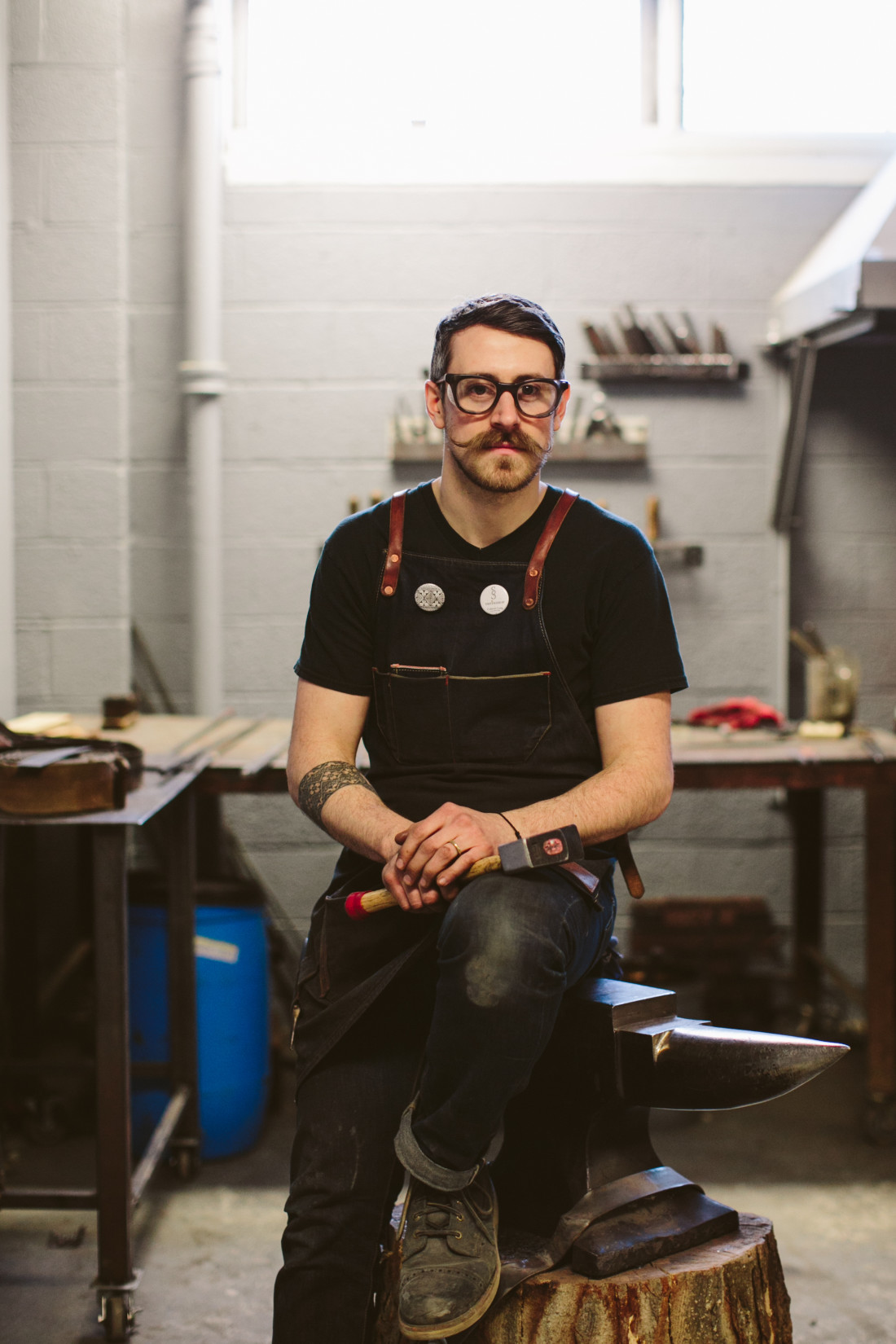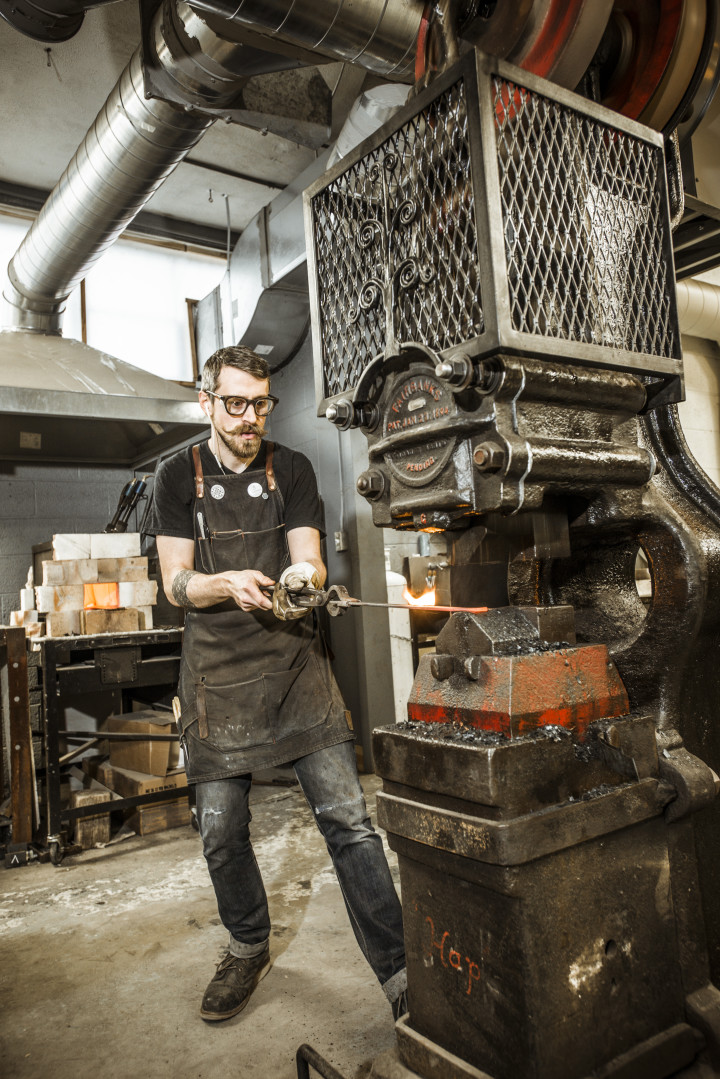Craft isn’t something most people commonly associate with performance, much less activism. But the two couldn’t be a better fit for Gabriel Craig, a Detroit-based metalsmith, jeweler, writer and, most importantly, a craft activist who uses performance to engage and educate audiences and fellow craftspeople on the environmental issues and ethics surrounding jewelry and metalsmithing.
Beginning Monday, April 20, Craig will take part in a collaborative 10-day artist residency at Warren Wilson College. He will also give a talk on his work, craft activism and materials sourcing in the burgeoning slow crafts movement. That even takes place at The Center for Craft, Creativity and Design on Wednesday, April 22, at 6:30 p.m.
Slow Craft
If you dine out in Asheville, there’s a good chance that the restaurant will share the farmed sources of your meal. It’s less likely that that same showcasing extends to the metal legs of your chair or the brass chandelier that lights that space. In Asheville, these objects and fixtures are increasingly being made by local artisans, we as a crafts-consuming community have been slower to pay attention to the materials supply chain. But that can change with a little consumer and creator awareness, according to Craig. “Every person has a connection, a contribution to make. You just have to find the vehicle to engage people with,” he says. “Part of my responsibility as a crafts person is to find that vehicle.”
In 2007, while studying jewelry and metalworking at Virginia Commonwealth University, Craig found a solution to that gap. It was as simple as going outside. He began taking his work bench to the sidewalks of Richmond, where he’d make jewelry and, he says, preach the gospel of craft advocacy.
The performance, titled “The Collegiate Jeweler,” brought his work into the public sphere. The piece soon morphed into “The Pro Bono Jeweler,” which began introducing the benefits of slow, ethically-sourced metalsmithing. “If you’re bringing an object into being, you’re forced to think about where that material came from,” Craig says. “It causes you to slow down.” The ethical foundations of that practice pass to the consumer, who is more likely to share the story behind that new piece of art.
Pride and Paradox
In essence, Craig and organizations like Ethical Metalsmith and No Dirty Gold are picking up where the Arts and Crafts movement left off at the turn of the last century by pushing for responsible materials sourcing. The Arts and Crafts movement focused on ending labor exploitation and reviving the role of the crafts person and handmade goods in daily life. Recycling and sustainability were not on the agenda.
The problem, Craig says, is that green jewelry is inherently paradoxical. Extraction is the only means of obtaining new precious metals. That means catastrophic mining, displacing millions of pounds of earth and using chemicals like cyanide to purify ore. Jewelers can eliminate their reliance on virgin metals by using what’s already above ground.
“The recycling process, by comparison, is dramatically less invasive,” Craig says. Less water is used, no earth is removed and cyanide is replaced with reusable chlorine. And unlike aluminum, steel and alloys, gold, silver and platinum are rarely thrown away, leaving a reusable supply for jewelers. “Once these materials are out of the ground it’s out for good — it’s certainly not going back,” Craig says.
Identifying and proliferating these sources is the foundation of Craig’s practice and the greater ethical metalsmithing movement. “The most potent cultural role of the craftsperson today is to be the person or repository in society who can connect the origin of raw materials,” he says. Knowing where your metal comes from and using those which have been recycled is ultimately the only way to reduce the impact of metalsmithing. And if enough people push for it, this model will move into the copper, steel and brass industries.
“There’s no right answer, and I don’t have the answer,” Craig says, “I just want to be a part of the dialogue.”
Craig’s Warren Wilson College residency will explore that conversation on the local level, according to Madalyn Wafford, the events and residency organizer. “We’re basing a lot of it on the supply and demand chain specifically at Warren Wilson,” she says. “It’s focused largely on material resources.”
Craig will work alongside students on a series of “spontaneous craft symposiums,” and with the blacksmithing work crew on a service project for the Shiloh Community Garden. He and even cast a new piece for the college’s Gamelan Orchestra. The residency also sets in motion Warren Wilson’s push to unite its craft and fine art departments. “The crafts are separated as work crews, whereas the fine art is academic,” says fine arts and crafts intern Michelle Florence. “People like Gabriel are helping to bring that all together.”
WHAT: Craft in Culture: A Lecture by Metalsmith, Writer and Craft Activist Gabriel Craig
WHERE: The Center for Craft, Creativity and Design, craftcreativitydesign.org
WHEN: Wednesday, April 22, at 6:30 p.m. Free and open to the public. For more information on Craig, visit gabrielcraigmetalsmith.com or call Warren Wilson College at 771-3038




Before you comment
The comments section is here to provide a platform for civil dialogue on the issues we face together as a local community. Xpress is committed to offering this platform for all voices, but when the tone of the discussion gets nasty or strays off topic, we believe many people choose not to participate. Xpress editors are determined to moderate comments to ensure a constructive interchange is maintained. All comments judged not to be in keeping with the spirit of civil discourse will be removed and repeat violators will be banned. See here for our terms of service. Thank you for being part of this effort to promote respectful discussion.